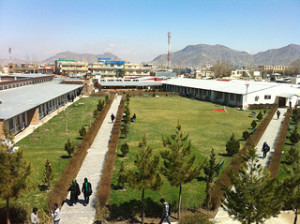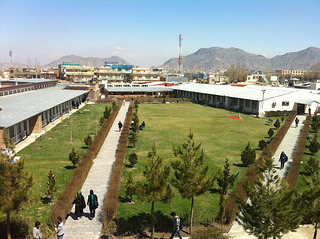In 2007, two Stanford law students approached Erik Jensen, now director of the Rule of Law Program at Stanford Law School, with the idea of writing legal education textbooks to meet a growing demand for more widespread law enforcement and better judicial practices in Afghanistan.

The student-led Afghanistan Legal Education Project (ALEP) was created that year with the first textbook, titled “An Introduction to the Laws of Afghanistan,” sent to the American University of Afghanistan (AUAF) in Kabul for vetting by leading Afghan academics and law experts. ALEP was the first legal education project for the Rule of Law Program. By 2010, the project had produced three textbooks and was awarded a grant of $1.3 million by the U.S. Department of State’s Bureau of International Narcotics and Law Enforcement Affairs to continue its work.
“My students were demanding something where they could not delay the gratification of doing something meaningful in their lives and embrace the textbooks, and the students on the other side could not get enough of the textbooks,” Jensen said.
With five books published, ALEP helped establish a full-fledged law department this year at AUAF that grants graduates a bachelor’s degree in arts and law and offers a selective academic project for Stanford law students through which they gain real-world experience and degree credit by writing textbooks. ALEP is currently being led by Christopher Jones J.D. ‘14 and Samuel Jacobson J.D. ‘14.
Samira Abrar, an undergraduate from Kabul who received a scholarship from the U.S. Embassy and is now pursuing a law degree at AUAF through ALEP, said she appreciates the textbooks more than her domestic academic material.
“[The textbooks] are very high-quality and they are a reference on our own laws and also the parts they have been discussing in every chapter…[is] new for me,” Abrar said. “In our own textbooks we do not have such things. [The new textbooks] make us think critically or lead us to discuss more or to seek other solutions to address the problem.”
While the project has seen success over the past six years, ALEP will soon face new obstacles. With new presidential elections and therefore widespread uncertainty surrounding the future of Afghanistan’s social, economic and political security, 2014 will be a critical year for Afghanistan.
“The level of insecurity among Afghans—and this includes the students in AUAF—about 2014 is palpable,” Jensen said.
Abrar acknowledged this uncertainty, specifically in regards to the future of her own education.
“What’s going to happen in 2014 is not something clear for everybody,” Abrar said. “What we hope as a student is that they support the law program. I hope that any changes to the system will not have a negative effect on our studies.”
According to Megan Karsh, the Rule of Law Program teaching fellow for ALEP, the effect of insecurity on the degree program is already noticeable in the enrollment numbers.
“Enrollment has been growing more slowly than we expected.” Karsh said. “We just accept that there’s this uncertainty and we continue to provide the best classes we have.”
Looking past lower enrollment figures, one of the worst-case scenarios for Stanford’s program after the 2014 pullout of American troops from Afghanistan and national elections is the Taliban retaking control of the capital and shutting down universities in Afghanistan all together.
However both Ghizaal Haress—who began as an adjunct lecture for ALEP in 2012 and recently left her other responsibilities to become a full-time law faculty member at AUAF—and Jensen, as well as other experts, are relatively confident that Kabul will resist coming under Taliban control after 2014. Their greater concern is that Afghanistan will experience an economic recession that will undo the economic progress made since the fall of the Taliban.
“We’re looking at a really tough several years,” Jensen said. “But it’s not so much hinged on the insecurities of the pullout in 2014, as it is a really serious contraction in the Afghan economy where we need to figure out ways to bridge through these economically difficult times.”
AUAF students echo this concern, fearing that they will not be able to afford to pay tuition as the majority of American and international NGOs pull out and the economy worsens.
“This is a concern for every student because all of them who are studying at AUAF are supported financially either by their families or by a scholarship,” Abrar said. “So when their families are acquiring salaries with international projects mostly, it’s a big concern for them whether their projects will be continued after 2014 changes or not.”
“Myself, I am working on such a project. I am not sure whether I will be able to financially afford the cost of my education or not,” she added.
Abrar hopes that political changes will not affect her dream of becoming a lawyer through the ALEP program, but she explains that many students, herself included, still express fear despite promises of continued support from the international community.
Haress described investing in education as a natural concern for Afghan students and very much in line with the broader trend of decreasing investment in Afghanistan. According to Haress, many have refrained from buying cars and houses because of the growing uncertainty in the stability of Afghanistan’s financial markets.
“If people are not planning to invest much in property, they may not be willing to invest in a four-year program or a five-year program if they’re not completely sure what’s going to happen next,” Haress said.
Further affirming Jensen’s concern over the economy, the new year will affect ALEP’s efforts by reducing state resources, notably those used to pay the salaries of qualified judges, who, according to Haress, are already extremely limited in number. With the lack of basic living services for judges in Afghanistan as well as a minimal pension system, Haress explains the moral predicament behind not having economic assurance for the future.
“If a judge sees all of that, what are the incentives for him to be honest?” Haress said. “He will take bribes to just make sure that he has a house to live, that his children go to school, and they have enough to eat, and they have enough clothes.”
Additionally, the relatively high number of women pursuing law degrees or taking law-related classes at AUAF—a continuing achievement for ALEP—might be jeopardized by a resurgence of the Taliban and increased insecurity in the country.
Despite the numerous obstacles that ALEP has to confront, much optimism has been expressed surrounding the continued endurance of the program.
With growing demand for textbooks from Afghan law students as well as the growing interest in real-life legal educational experience from Stanford students, ALEP was awarded an additional $7.24 million grant from the U.S. Department of State in 2012, which, according to Karsh, allowed the project to expand its efforts significantly and further strengthen its partnership with AUAF.
The latest grant lasts until 2017, and according to Jensen, many grants given by the U.S. government are intentionally longer term, in part to assuage the fears among Afghans about the uncertainty post-2014 and refute the idea that the U.S. will just pick up and ship out of Afghanistan as history might warn.
“I think American University [in Afghanistan] will continue,” Haress said. “I think the number of students that we have here will continue to study here, because it’s one of the most prestigious educational institutions that we have in the country.”
Jensen further explained that they have hired a new professor this year from the Nangarhar province of Afghanistan, an area that experiences significant security challenges. They are also working to develop closer ties with Nangarhar University to increase outreach and textbook distribution beyond Kabul.
A group of Stanford law students currently working with ALEP is scheduled to travel to Kabul in February 2014 to meet with AUAF law professors, judicial officials and ministers, as well as the AUAF students who will provide them with feedback on their textbooks.
“We have a mandate,” Karsh said. “We are helping to establish this law department and we’re providing curriculum for the next five years. No matter what happens in 2014, we are going to continue providing this educational opportunity.”
Contact Alexa Liautaud at alexal ‘at’ Stanford ‘dot’ edu.
